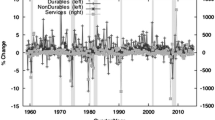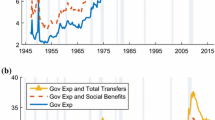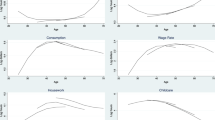Summary.
To a greater extent than is often stressed in existing literature, preference assumptions affect responses to money shocks in equilibrium monetary models. Temporary money shocks can have persistent real effects if the marginal utility of leisure is a decreasing function of consumption, where leisure is measured as time endowment less market labor effort, and consumption refers to market produced goods. This condition is an empirically supported implication of home production models. Though not theoretically necessary for supporting the existence of short run real effects, the presence of distortionary taxes and endogenous productivity can have significant quantitative effects on responses to temporary money supply shocks.
Similar content being viewed by others
Author information
Authors and Affiliations
Additional information
Received: August 21, 1996; revised version: February 3, 1997
Rights and permissions
About this article
Cite this article
Matheny, K. Non-neutral responses to money supply shocks when consumption and leisure are Pareto substitutes. Economic Theory 11, 379–402 (1998). https://doi.org/10.1007/s001990050192
Issue Date:
DOI: https://doi.org/10.1007/s001990050192




